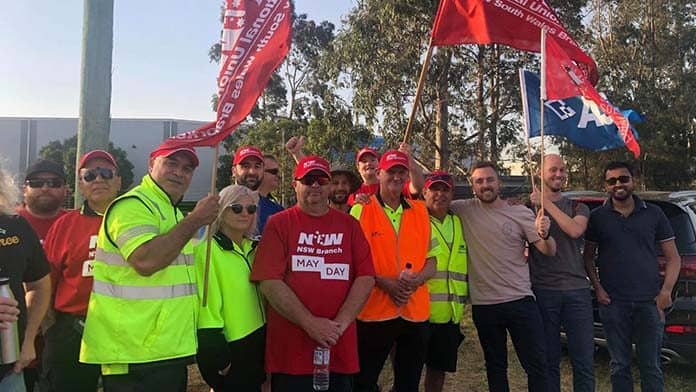Woolies Warehouse workers in Sydney have won a 16 per cent pay rise over three years after a solid 24 hour strike.
The strike by 1000 workers at the Minchinbury distribution centre, “sent a clear message to management” union delegate Matthew Mattaio said. Both permanent and casual staff completely shut down the warehouse, with hard pickets stopping trucks from entering the strategic Western Sydney centre.
Management’s attitude to the workforce was on display during the strike, as they set up a large mobile surveillance camera set up in close proximity to the picket line. Workers have face bullying and intimidation from managers, triggering a spontaneous illegal walk-out earlier this year.
But in the face of further indefinite strike action set to begin on 15 November, management gave in on many of the workers’ demands.
The 16 per cent wage increase over the three year enterprise agreement includes a front-loaded 8 per cent in the first year, followed by 4 per cent annual increases afterwards.
The big pay increases followed a campaign, “to get equality pay with all the other Woolies people that do similar workloads”, Matthew told Solidarity. The workers’ initial claim was for 16 per cent in the first year and 28 per cent over three years. Workers at warehouses in Victoria are paid 16 per cent more than the workers in Sydney.
But in the context of record low wage growth for workers of just 2.2 per cent a year, the result is a “really good outcome”, Matthew said.
The pay increase will provide much needed assistance to the Sydney workers, with the highest cost of living of any city in the country. The workers are members of the newly-formed United Workers Union (UWU), formerly NUW members.
Workers have also secured increased redundancy entitlements of four weeks for each year’s service, now capped at 82 weeks total as opposed to 40 weeks previously for redundancy payouts. This will help protect workers against the threat of job losses from automation.
There will also be more transparent pathways for casuals to become permanent, with length of service a deciding factor. This was a great reflection of the solidarity of the picket line where casuals—some who were not even rostered on for that day—stood side by side with permanents on the picket line. As many as 400 of the workers at the warehouse are casuals.
The result showed how strike action and strong union organisation can win serious gains on pay and conditions.
By Jess Whittall






